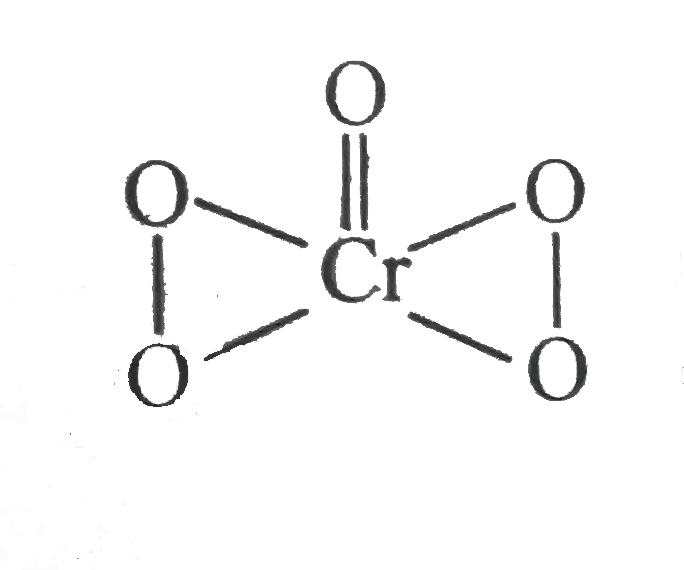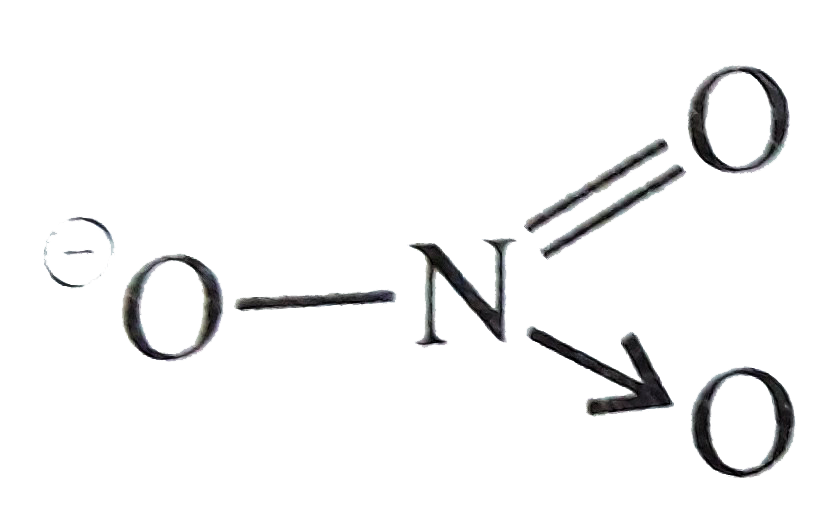Calculate the oxidation number of sulphur , chromium and nitrogen in H2SO5,Cr2O2−7 and NO−3 . Suggest structure of these compounds . Count for the fallacy .
a. Oxidation number of S in H2SO5
By convenctional method, the oxidation number of S in H2SO5 is
2(+1)+x+5(−2)=0 or, x=+8
This is impossible because the maximum oxidation number of S cannot be more than six since it has only six electrons in the valence shell. This fallacy is overcome if we calculate the oxidation number of S by chemical bonding method.
H−O−O∣∣S∣∣O−O−O−H
2×(+1)(for H)+x(for S)+2(−1)for(O-O)+3×(−2)=0(for other O atoms)
or x=+6
b. Oxidation number of Cr in CrO5
According to conventional method, oxidation number of Cr is: x+5(−2)=0 or x=+10. Thus is impossible because the maximum oxidation number of Cr cannot be more than six since it has 3d54s1 outer orbital configuration. This fallacy is removed if we calculate oxidation number of Cr by chemical bonding method. The structure of. CrO5 is (Butterfly structure)

From the structure, the oxidation number of Cr can be calculated as follows:
x+4(−1)+1(−2)=0 or x=+6
(for O-O)(for=O)
c. Oxidation number of N in NOΘ3.
According to conventional method, oxidation number of N is NOΘ3=x+3(−2)=−1 or x=+5
According to the chemical bonding method,

x+1(−1)(for OΘ)+1(−2)(for=O)+1(−2)=0(for →)
or x=5
Thus, there is no fallacy about the oxidation number of N in NOΘ3 whether one calculates by conventional methoc or by chemical bonding method.
Topper's Solved these Questions
- NCERT BASED EXERCISEBOOK - CENGAGE CHEMISTRY ENGLISHCHAPTER - NCERT BASED EXERCISEEXERCISE - Atomic Structure
94 Videos
- NCERT BASED EXERCISEBOOK - CENGAGE CHEMISTRY ENGLISHCHAPTER - NCERT BASED EXERCISEEXERCISE - Thermodynamics
50 Videos
- NCERT BASED EXERCISEBOOK - CENGAGE CHEMISTRY ENGLISHCHAPTER - NCERT BASED EXERCISEEXERCISE - Chemical Equilibrium
73 Videos
- ISOMERISMBOOK - CENGAGE CHEMISTRY ENGLISHCHAPTER - ISOMERISMEXERCISE - Assertion-Reasoning Type
1 Videos
- ORGANIC REACTION MECHANISMBOOK - CENGAGE CHEMISTRY ENGLISHCHAPTER - ORGANIC REACTION MECHANISMEXERCISE - Analytical and Descriptive
6 Videos
Similar Questions
Calculate the oxidation number of sulphur, chromium, and nitrogen in H2SO5,Cr2O2−7 and NOΘ3. Suggest the structure of these compounds. Count for the fallacy.
View SolutionCalculate the oxidation number of nitrogen in NO−3. Suggest structure of this compound. Count for the fallacy.
View SolutionCalculate the oxidation number of the underlined element in the following ions.
Cr2––––O2−7
View SolutionThe oxidation number of sulphur in H2S2O8 is:
View SolutionCalculate the oxidation number of Sulphur in H2SO5. Suggest structure of this compounds. Count for the fallacy.
View SolutionCalculate the oxidation number of Chromium in CrO5 . Suggest structure of this compound. Count for the fallacy.
View SolutionCalculate the oxidation number of the underlined element in the following molecules.
K2Cr2––––O7
View SolutionCalculate the oxidation number of nitrogen in the following oxides.
N2O,NO,N2O3,NO2,N2O5
View SolutionThe oxidation state of sulphur in H2SO5 and chromium in K2Cr2O7 respectively is :-
View SolutionFind the oxidation number of sulphur in the following compounds: H2S,H2SO4,S2O2−4,S2O2−8,HSOө3.
View Solution
